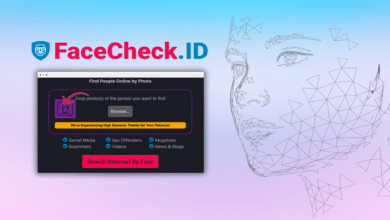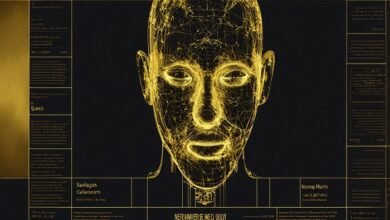Facecheck ID: Revolutionizing Online Verification and Security

In today’s digital age, online security and privacy have become critical issues. As the world becomes increasingly interconnected, it’s more important than ever to have a secure and reliable method of verifying identities. This is where Facecheck ID comes into play, a cutting-edge solution that is transforming the way we verify identity online. But what is Facecheck ID, and how does it work? In this post, we will explore the technology behind Facecheck ID, its uses, benefits, challenges, and its potential impact on the future of online security.
What is Facecheck ID?
Facecheck ID is an advanced identity verification solution that uses facial recognition technology to confirm a person’s identity. By scanning the unique features of an individual’s face, Facecheck ID creates a digital representation of that person, which can then be used to verify their identity. This method is far more secure than traditional forms of verification, such as passwords or PINs, which can easily be stolen or forgotten.Unlike traditional methods of identity verification, Facecheck ID ensures that the person trying to gain access is indeed who they claim to be. This is because facial recognition technology is extremely difficult to fake, providing a more reliable and secure way to confirm identity.
How Does Facecheck ID Work?
Facecheck ID works by capturing an image or video of the user’s face, usually via a camera or smartphone. The software then analyzes the unique features of the face, such as the distance between the eyes, the shape of the jawline, and the position of the nose and mouth. Using machine learning algorithms, Facecheck ID compares these features to a pre-existing database to verify the identity of the person.Once the facial scan is completed, Facecheck ID cross-references the data with a secure database, which contains information about the individual’s face. If the scan matches the database entry, the system confirms the identity. In some cases, additional verification methods like voice recognition or a PIN code may be required to ensure the security of the process.This combination of biometric data and advanced algorithms makes Facecheck ID an incredibly effective tool for online security. It provides a seamless, quick, and reliable way to confirm identity, without the need for complex passwords or physical documents.
The Benefits of Facecheck ID
The introduction of Facecheck ID has brought several notable benefits to online verification. For both businesses and users, this technology is proving to be a game-changer in terms of efficiency, security, and user experience.
Enhanced Security
One of the key benefits of Facecheck ID is enhanced security. Facial recognition is far more difficult to compromise than traditional methods like passwords or PINs. Since a person’s face is unique, it is nearly impossible to replicate, reducing the risk of identity theft and fraud. Even in cases where someone tries to use a photo or video of the person, the system can often detect this and reject the request.
Seamless User Experience
With Facecheck ID, users can quickly and easily verify their identity without having to remember complicated passwords or carry physical documents. This makes the process faster and more convenient, reducing the chances of frustration or abandonment during online transactions.
Reduced Fraud
Since facial recognition is highly accurate, it helps reduce fraud and unauthorized access. This is especially important for industries such as banking, healthcare, and government services, where verifying the identity of users is critical.
Privacy Preservation
Another important benefit of Facecheck ID is its ability to protect user privacy. Unlike passwords, which are often stored and can be hacked, facial recognition data is typically encrypted and stored in a secure database. As a result, even if a hacker were to gain access to a system, they would not be able to steal the user’s identity through Facecheck ID.
The Applications of Facecheck ID
The uses of Facecheck ID extend across various industries, each benefiting from its ability to enhance security and streamline user verification. Some of the key applications of this technology include:
Online Banking and Financial Services
Facecheck ID has revolutionized the financial sector by allowing users to access their accounts, approve transactions, and make payments securely. Instead of relying on passwords or security questions, users can simply scan their face to authenticate their identity. This not only improves security but also offers a faster and more convenient way to interact with banking services.
Healthcare
In healthcare, Facecheck ID is used to protect patient information and ensure that only authorized personnel can access sensitive data. It can also be used to verify the identity of patients before administering treatments, reducing the risk of medical errors. Moreover, Facecheck ID can be used for remote consultations, ensuring that the person seeking advice is the correct patient.
Government Services
Governments around the world are beginning to implement Facecheck ID for various services, such as applying for passports, signing legal documents, and voting in elections. The technology provides a high level of security, preventing fraud and ensuring that services are provided to the correct individuals.
Retail and E-commerce
In retail and e-commerce, Facecheck ID is being used to streamline the checkout process. Instead of entering credit card details or passwords, users can simply verify their identity using their face. This reduces friction in the purchasing process, leading to higher conversion rates and a better user experience.
Workplace Security
In the workplace, Facecheck ID can be used to manage access control to secure areas. It can replace traditional ID cards, ensuring that only authorized employees can enter restricted zones. Additionally, it can help track attendance and monitor employee movements, enhancing overall security in corporate environments.
Challenges and Concerns with Facecheck ID
Despite its many benefits, Facecheck ID is not without its challenges. There are several concerns and potential drawbacks that need to be addressed as the technology continues to evolve.
Privacy Concerns
One of the most significant concerns surrounding Facecheck ID is privacy. Since the system relies on scanning and storing biometric data, some users may feel uneasy about their faces being stored in databases. There is also the risk that facial recognition data could be used without consent, leading to potential violations of privacy.
Accuracy Issues
While facial recognition technology has improved significantly, it is not flawless. There are still concerns about its accuracy, particularly in cases where individuals have certain physical conditions or features that make it difficult for the system to accurately identify them. Additionally, poor lighting conditions or low-quality cameras can affect the system’s ability to perform an accurate scan.
Ethical and Legal Issues
The use of Facecheck ID raises ethical and legal questions, particularly regarding consent and the potential for misuse. For instance, some people may be concerned that facial recognition could be used for surveillance without their knowledge or consent. Additionally, the storage and use of biometric data are subject to various regulations and laws, which vary by region.
Technical Barriers
Implementing Facecheck ID requires significant infrastructure, including high-quality cameras, advanced software, and secure storage systems. For many businesses, this could be a costly investment, especially if they operate in regions where the technology is not yet widespread. Furthermore, the technology may not be accessible to all individuals, particularly those with limited access to the latest devices.
The Future of Facecheck ID
As facial recognition technology continues to advance, Facecheck ID is expected to become an even more integral part of our daily lives. In the future, we can anticipate improvements in both the accuracy and reliability of these systems, making them even more effective at preventing fraud and enhancing user security.We may also see increased adoption of Facecheck ID in emerging technologies such as smart cities, autonomous vehicles, and virtual reality. With the rise of the Internet of Things (IoT) and 5G connectivity, the potential applications for Facecheck ID are limitless. As long as privacy and security concerns are addressed, Facecheck ID could become the standard method for identity verification in the coming years.
Conclusion
In conclusion, Facecheck ID is a revolutionary advancement in the field of identity verification, providing businesses and users with a secure, efficient, and seamless way to confirm identity. While the technology offers numerous benefits, including enhanced security and improved user experience, it also raises important concerns related to privacy, accuracy, and ethics. As the technology continues to evolve, it is crucial for governments, businesses, and consumers to strike a balance between security, privacy, and accessibility.As we move forward into an increasingly digital world, Facecheck ID stands at the forefront of the biometric revolution. By improving online verification, reducing fraud, and providing greater convenience, Facecheck ID is poised to change the way we interact with the digital world.
FAQs
1. What is Facecheck ID used for? Facecheck ID is used for secure and reliable identity verification by analyzing facial features. It is commonly used in banking, healthcare, government services, and more.
2. Is Facecheck ID secure? Yes, Facecheck ID is highly secure. It uses advanced facial recognition technology to verify identities, making it more difficult to compromise compared to traditional methods like passwords.
3. Can Facecheck ID be hacked? While no system is completely foolproof, Facecheck ID is designed to be resistant to hacking. It uses advanced algorithms and biometric data, which are much harder to fake or steal than traditional credentials.
4. Is Facecheck ID privacy-friendly? Facecheck ID is designed with privacy in mind. The biometric data is typically encrypted and stored securely, reducing the risk of unauthorized access.
5. What are the challenges with Facecheck ID? Some challenges with Facecheck ID include privacy concerns, potential ethical issues, technical barriers, and the need for high-quality infrastructure for implementation.





